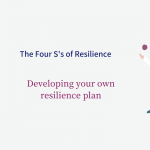In today’s fast-paced and often chaotic world, mindfulness and meditation offer a pathway to cultivate present-moment awareness and find inner calm. Rooted in ancient traditions, these practices have gained significant recognition for their ability to reduce stress, increase self-awareness, and enhance overall well-being. This article explores the concepts of mindfulness and meditation, their benefits, and practical ways to incorporate them into daily life, empowering individuals to live more fully in the present moment.
I. Understanding Mindfulness and Meditation:
- Mindfulness: Mindfulness refers to paying deliberate attention to the present moment without judgment. It involves consciously observing thoughts, emotions, bodily sensations, and the surrounding environment with a non-reactive and accepting mindset.
- Meditation: Meditation is a practice that cultivates a state of focused attention and heightened awareness. It involves engaging in specific techniques, such as focusing on the breath, visualizations, or mantras, to quiet the mind and enter a state of deep relaxation.
II. Benefits of Mindfulness and Meditation:
- Stress Reduction: Mindfulness and meditation have been shown to reduce stress levels by promoting relaxation and activating the body’s relaxation response. Regular practice can help individuals manage daily stressors more effectively and improve overall resilience.
- Increased Self-Awareness: By practicing mindfulness and meditation, individuals develop a deeper understanding of their thoughts, emotions, and patterns of behavior. This heightened self-awareness allows for more intentional decision-making and the ability to respond rather than react to life’s challenges.

- Improved Mental Well-being: Mindfulness and meditation have been linked to improved mental health outcomes, such as reduced symptoms of anxiety and depression. These practices can help individuals cultivate a more positive mindset, regulate emotions, and develop a greater sense of inner peace.
- Enhanced Focus and Concentration: Regular practice of mindfulness and meditation strengthens the ability to sustain attention and focus. This benefit extends to daily activities, such as work or studying, leading to improved productivity and performance.
- Increased Empathy and Compassion: Mindfulness and meditation foster a sense of connection and empathy towards oneself and others. By cultivating a non-judgmental and compassionate mindset, individuals develop greater understanding and acceptance of different perspectives and experiences.
III. Incorporating Mindfulness and Meditation into Daily Life:
- Formal Practice: Set aside dedicated time for formal mindfulness or meditation practice. Start with short sessions, gradually increasing duration as comfort and familiarity grow. Experiment with various techniques, such as guided meditations, body scans, or mindful breathing exercises, to find what resonates best.
- Informal Practice: Infuse mindfulness into daily activities by bringing focused attention to routine tasks. For example, while brushing teeth or eating a meal, consciously engage the senses, notice sensations, and be fully present in the moment.
- Mindful Movement: Engage in activities that promote mindful movement, such as yoga, Tai Chi, or walking meditation. These practices combine physical movement with present-moment awareness, fostering a mind-body connection.
- Mindful Pause: Take intentional breaks throughout the day to pause, breathe, and reconnect with the present moment. This can be as simple as stepping outside for a few minutes, focusing on the breath, or noticing the sensations of the body.
- Mindful Communication: Practice mindful communication by being fully present when engaging in conversations. Listen attentively, observe non-verbal cues, and respond with empathy and understanding, fostering deeper connections with others.

IV. Overcoming Challenges and Sustaining Practice:
- Patience and Persistence: Mindfulness and meditation are skills that develop over time. Be patient with the process and persist in the practice, even when faced with challenges or distractions. Consistency is key to experiencing the transformative benefits.
- Non-Judgmental Attitude: Approach mindfulness and meditation with a non-judgmental mindset. Acknowledge that thoughts, emotions, and distractions are natural and part of the practice. Instead of resisting or criticizing them, cultivate an attitude of acceptance and gently bring the focus back to the present moment.
- Seek Guidance and Support: Joining a meditation group, attending workshops, or seeking guidance from experienced practitioners can provide valuable support and deepen the practice. These communities offer opportunities for learning, sharing experiences, and staying motivated.
Mindfulness and meditation offer powerful tools for cultivating present-moment awareness, reducing stress, and enhancing overall well-being. By incorporating these practices into daily life, individuals can develop a deeper connection with themselves and the world around them. Through mindfulness and meditation, we can navigate life’s challenges with greater clarity, compassion, and resilience, ultimately living more fulfilling and meaningful lives in the present moment.




















Add Comment